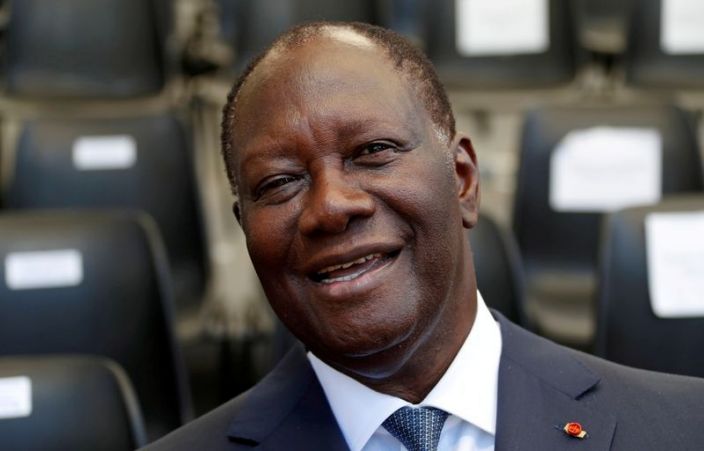Ivorian President Ouattara’s plans to modify the constitution scrutinized

BY SOUMANOU SALIFOU
The announcement two days ago by Ivorian President Alassane Ouattara of his plan to modify the constitution raises questions about his intention just a shy ten months before the upcoming October presidential election.
The president made the unexpected remarks Monday in his reply to the traditional new year’s greetings extended to him by the collective of the institutions: “In the course of the first quarter of this year, I will submit to the parliament modifications to the Constitution of the Third Republic to make it more coherent and in line with the observations that I have received from the committee that wrote the Constitution.” Ouattara added: “Let me assure everyone that the intention is not to bar anyone.”
The parliament, which is controlled by Ouattara’s party, would swiftly approve the president’s request for modifying the constitution.
Ivorian voters approved a new constitution no later than 30 October 2016. So, while the president’s announcement did not cause as much discussion, let alone the uproar triggered by his statement, back in June 2018, that the new constitution resets the clock for a new beginning of sorts that allows him to run again, one wonders what really the president wants to do to the brand-new fundamental law.
Chief among the floating speculations, the likelihood that Ouattara intends to re-instate the 75-year age limit that was removed from the old constitution, for the purpose of stopping members of the old political guard, former President Laurent Gbagbo who will be 75 in May, and former President Henri Konan Bedie, 85, from running.
While President Ouattara has stated on multiple occasions that he might seek a third term, he is yet to formally announce his candidacy. Despite his more recent utterance about the matter barely a month ago, many still doubt the 78 years old head of state has any appetite for a third term. It appears, instead, that he has been grooming his prime minister, Amadou Gon Coulibaly, to succeed him.
The prime minister’s northern roots are likely to mislead observers unfamiliar with the track record of President Ouattara—who is also from the north—into thinking that Ouattara is playing the ‘regional card’ or ‘ethnic card’ so common in African politics by apparently ‘preparing’ Coulibaly to succeed him. The president’s often-repeated concern to preserve his legacy, especially on the economic level, arguably tells the real story.
In early July 2019, exactly a year after Ouattara publicly stated for the first time that the new constitution allows him to seek a third term—if he so chooses—he said in remarks made during a rally in Katiola, up-country: “Be assured, my intention is to hand over power to the new generations. But I want all those of my generation to know that our time is gone, that we must all step aside.” Then the president dropped a bomb by adding, clearly in reference to former presidents Henri Konan Bedie and Laurent Gbagbo: “So, if they run I will do so, too.”
In the same address, the president also reiterated his commitment to safeguarding the economic and political gains of his two terms, and quickly pointed to the fact, in his view, that the former presidents’ records speak to their inability to safeguard his economic legacy:
“Cote d’Ivoire is going forward, but not with just anybody,” Ouattara stated, and reminded the audience of the records of his predecessors. “The Ivorian people don’t want to relive the embezzlement of funds, the waste of resources, and the division of the past.” The president insisted: “It would be too easy for some people with the records they are known for to think they can come back and do the same thing.”
President Ouattara has won praises for turning around the economy of Cote d’Ivoire that was ruined under Gbagbo’s turbulent rule, with GDP growth rate over 8% year after year. With the economic engine of the leading member of the 8-nation West African Economic and Monetary Union back on, Abidjan, the largest city, became virtually overnight a vast construction site, with hotels and office buildings popping out of everywhere. Not to mention important infrastructure—roads and bridges—in Abidjan itself and in other regions.
This lends credence to the theory that President Ouattara plans on modifying the constitution to make sure the torch is passed on to a member of the younger generations, one like Prime Minister Amadou Gon Coulibaly, 60, with a good economic track record.
Coulibaly, who served as then-prime minister Ouattara’s technical adviser in the 1990s, became prime minister in 2017 and kept the position even after the president dissolved the government in 2018 in response to growing political tension.
In a 11 June 2018 interview with the Paris-based African weekly magazine Jeune Afrique, when asked “Are you satisfied with Amadou Gon Coulibaly’s government,” President Ouattara replied: “Amadou Gon is an excellent prime minister, competent and very dynamic. He’s an engineer that I had the opportunity to train for nearly 25 years. He’s an authoritative man who knows how to make hard choices and achieve results.”


